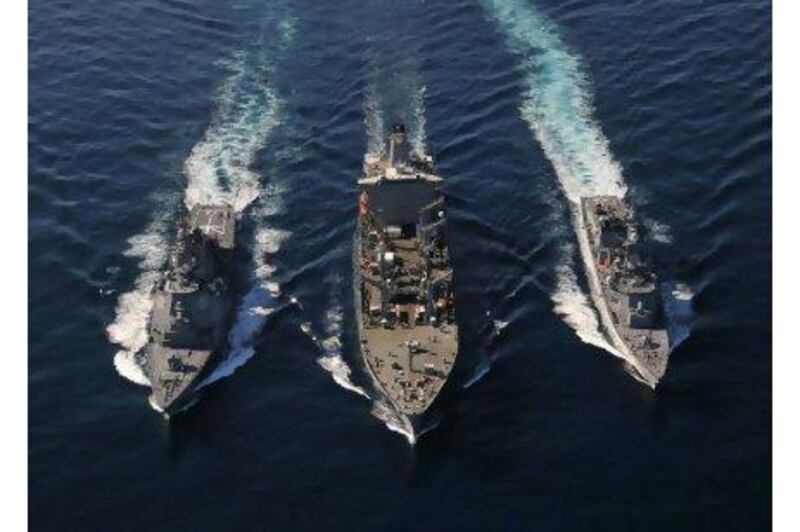BEIJING // Seoul yesterday indicated it would strike back heavily in the event of a new assault from North Korea and held further live-firing exercises amid warnings from China that tensions could "run out of control".
The military exercises were held on South Korea's east, west and south coasts, although they did not involve Yeonpyeong island, shelled two weeks ago by North Korea in response to drills in the area. Four people died in the attack, including two civilians whose funerals were held yesterday.
Also yesterday, the prosecutor of the International Criminal Court announced a probe into suspected war crimes committed by North Korea in the shelling of the island and the sinking of a warship the Cheonan in March.
As the sound of the war games echoed across the region, the US president, Barack Obama, telephoned his Chinese counterpart, Hu Jintao, to call on China to do more to rein in its ally North Korea.
According to the White House, Mr Obama "urged China to work with us and others to send a clear message to North Korea that its provocations are unacceptable", Bloomberg news reported.
China's official Xinhua news agency reported Mr Hu as saying he was "greatly concerned" about the risk of conflict.
"The fragile security situation on the Korean Peninsula, if not properly handled, could lead to further escalation of tension, or even run out of control," Xinhua quoted Mr Hu as saying.
Mr Hu repeated China's calls for the stalled six-party talks on North Korea's nuclear programme, involving both Koreas, the US, Japan, China and Russia, to be restarted.
However, yesterday, the US secretary of state, Hillary Clinton, the South Korean foreign minister, Kim Sung-hwan, and the Japanese foreign minister, Seiji Maehara, were due to hold their own talks in Washington on the issue.
Their meeting followed reports in The Washington Post that the US felt China was allowing North Korea "to behave with impunity" by not acting on Pyongyang's alleged breaches of UN Security Council resolutions and other agreements.
"We think the Chinese have been enabling North Korea," the Post quoted a "senior administration official" as saying.
In recent days uncompromising rhetoric from both Korean capitals has indicated the peninsula remains on a knife edge.
On Sunday, Pyongyang said South Korea's continued military exercises showed Seoul was "hell-bent on the moves to escalate the confrontation or start a war", the official KCNA news agency warned.
The new South Korean defence minister, Kim Kwan-jin, appointed after his predecessor was blamed for what some saw as a weak response to the shelling of Yeonpyeong, yesterday said "we can immediately retaliate if North Korea provokes."
Also, an ad-hoc presidential security panel convened after the South Korean warship Cheonan was sunk in March with the loss of 46 lives - an incident widely blamed on Pyongyang - yesterday said Seoul should expand its marine corps from 5,000 personnel at present to 12,000, the official Yonhap news agency reported. Further recommendations included turning the marine corps into a "rapid reaction force".
The panel also said the current trend to cut military service should be reversed and a 24-month period of service reinstated.
Despite the continued rhetoric, the regional foreign affairs analyst Zhang Baohui, an associate professor of political science at Lingnan University in Hong Kong, said escalation was unlikely.
"The North Koreans know the limit of their provocation," he said. "They know the South Koreans are cornered, and South Korea has said another attack would provoke forceful retaliation.
Given the level of public anger towards North Korea and over what many saw as inadequate retaliation to last month's shelling, Mr Zhang said the South Korean government would have little choice but to hit back much harder if the North launched further strikes.
"The North Koreans ... know if they do another round of provocation, it will only cause a lot of displeasure on the part of their main patron, China," Mr Zhang added.
Efforts to resettle Yeonpyeong residents who fled when the island was bombarded were unveiled yesterday. Seoul announced 30 billion won (Dh97m) to fund medical and financial programmes, new air-raid shelters, resettlement and rebuilding.
Yonhap also reported additional air-raid shelters would be created on other islands close to North Korea.
* With additional reporting by the Associated Press






